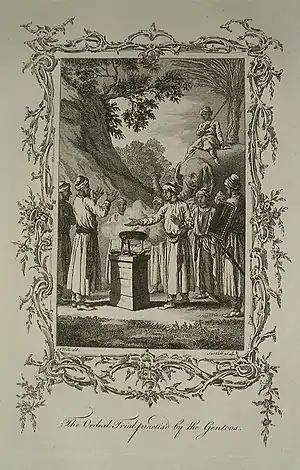গেন্টো (পরিভাষা)
গেন্টো বা গেন্টূ বা 'জেন্টূ' শব্দটি ভারতীয় আদি অধিবাসীদের জন্য ব্যবহৃত একটি শব্দ৷ মুসলমানদের হতে আলাদা ধর্মীয় পরিচয় নির্ধারণে হিন্দু শব্দোদয়ের পূর্বে ইউরোপীয় পরিব্রাজকদের দ্বারা এ শব্দটির ব্যাপক ব্যবহার হয়েছে৷[1][2][3][4]

1770 সালের একটি চিত্রকর্মে দেখা যায় যে, গেন্টো লোকেরা তাদের ধর্মীয় বিধান পালনরত অবস্থায় রয়েছে৷
গেন্টিও এবং গেন্টো শব্দদ্বয় ঐতিহাসিক ভাবে ভারতের আদিম অধিবাসীদের চিহ্নিত করনে প্রয়োগ হত৷ হিন্দো শব্দটি ধর্মীয় পরিচয় হিসেবে পরিগণিত হবার পর তৎকালীন মাদ্রাজ প্রেসিডেন্সীর তেলেগু ভাষী লোকেদের আলাদা পৃথক পরিচয় নির্ধারণে ব্যবহত হয়েছে মালবার ও তামিল ভাষী লোকেদের থেকে আলাদা শনাক্তের জন্যে৷[1][3][5][6]
আরও দেখুন
তথ্যসূত্র
- Dalgado, Sebastião Rodolfo; Anthony Xavier Soares (১৯৮৮)। Portuguese vocables in Asiatic languages: from the Portuguese original of Monsignor Sebastião Rodolfo Dalgado, Volume 1। Asian Educational Services। পৃষ্ঠা 167–168। আইএসবিএন 978-8120604131।
- Ernst, Carl W. (১৯৯২)। Eternal garden: mysticism, history, and politics at a South Asian Sufi center। SUNY Press। পৃষ্ঠা 287। আইএসবিএন 978-0791408841।
- "The English Invention of Hinduism"। raceandhistory.com। সংগ্রহের তারিখ মার্চ ১৫, ২০১২।
- Yule, Henry; A. C. Burnell; William Crooke (১৯৯৬)। A glossary of colloquial Anglo-Indian words and phrases। Routledge। পৃষ্ঠা 367–368। আইএসবিএন 978-0700703210।
- Srivastava, Sushil (২০০১)। "Situating the Gentoo in History"। Economic and Political Weekly। 36 (7): 576–594। জেস্টোর 4410294।
- Anand (২০০২-০৩-০৩)। "Origins of 'India'"। The Hindu। নভেম্বর ১০, ২০০৩ তারিখে মূল থেকে আর্কাইভ করা। সংগ্রহের তারিখ মার্চ ১৫, ২০১২।
This article is issued from Wikipedia. The text is licensed under Creative Commons - Attribution - Sharealike. Additional terms may apply for the media files.